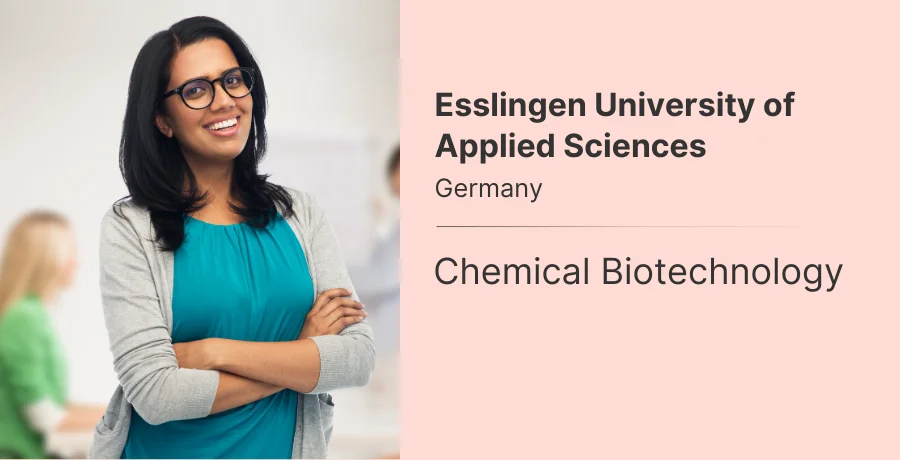Chemical Biotechnology at University of Stuttgart Germany
Table of Contents
- Chemical Biotechnology at University of Stuttgart Germany – Highlights
- Why Study Chemical Biotechnology at University of Stuttgart Germany?
- University of Stuttgart Chemical Biotechnology Rankings
- University of Stuttgart Chemical Biotechnology Acceptance Rate
- Popular Chemical Biotechnology Courses at University of Stuttgart Germany
- Admission Requirements to Chemical Biotechnology at University of Stuttgart Germany
- Cost of Chemical Biotechnology at University of Stuttgart Germany for Indian Students
- Scholarships at University of Stuttgart Germany
- Job Prospects for Chemical Biotechnology at Germany
- FAQs – Chemical Biotechnology at University of Stuttgart Germany
Chemical Biotechnology at University of Stuttgart Germany – Highlights
The University of Stuttgart in Germany offers an advanced course in Chemical Biotechnology that combines both theoretical and practical approaches to biotechnology. The city of Stuttgart is known for its strong industrial base, making it an excellent location for students to gain hands-on experience. The program focuses on equipping students with the skills needed for a successful career in the biotechnology industry.
The curriculum is designed to cover various aspects of chemical biotechnology, including bioprocess engineering, molecular biology, and bioinformatics. Students benefit from state-of-the-art facilities and laboratories, as well as opportunities for research and internships with leading biotech companies in the region.
Why Study Chemical Biotechnology at University of Stuttgart Germany?
Studying Chemical Biotechnology at the University of Stuttgart offers a unique blend of academic rigor and practical experience. The university is renowned for its research output and strong ties with the industry, providing students with numerous opportunities for internships and collaborations. The city of Stuttgart itself is a hub for technological innovation, offering a vibrant environment for students to thrive.
- Strong industrial connections
- State-of-the-art facilities
- Research opportunities
- Internationally recognized faculty
University of Stuttgart Chemical Biotechnology Rankings
| Ranking | Source |
|---|---|
| Top 100 | US News and World Report |
| Top 150 | QS Ranking |
| Top 200 | THE Ranking |
| Top 250 | ARWU Ranking |
University of Stuttgart Chemical Biotechnology Acceptance Rate
- The acceptance rate for the Chemical Biotechnology program is competitive, reflecting the high demand and rigorous admission standards.
- Applicants are evaluated based on their academic performance, research experience, and motivation for pursuing the course.
Popular Chemical Biotechnology Courses at University of Stuttgart Germany
Bachelor's Programs:
- Bioprocess Engineering: Focuses on the design and development of processes for the production of biochemicals, biofuels, and pharmaceuticals.
- Molecular Biotechnology: Emphasizes the application of molecular biology techniques in biotechnology to solve real-world problems.
Master's Programs:
- Advanced Chemical Biotechnology: Offers in-depth knowledge in areas such as metabolic engineering, synthetic biology, and biocatalysis.
- Industrial Biotechnology: Prepares students for careers in the biotech industry, focusing on large-scale production and quality control.
Admission Requirements to Chemical Biotechnology at University of Stuttgart Germany
Admission to the Chemical Biotechnology program at the University of Stuttgart is competitive and requires a solid academic background in related fields.
Entry Requirements:
- University of Stuttgart Chemical Biotechnology entrance exam
- University of Stuttgart Chemical Biotechnology entry requirements
The eligibility criteria for the program include a strong foundation in chemistry, biology, and related subjects. Applicants must also demonstrate proficiency in English or German, depending on the language of instruction.
International students are encouraged to apply and may need to meet additional requirements, such as language proficiency tests and visa documentation.
Documents Required:
- Academic transcripts
- Letters of recommendation
- Statement of purpose
- Proof of language proficiency
Applicants must take proficiency tests such as TOEFL or IELTS for English-language programs, or TestDaF for German-language programs. The tests ensure that students have the necessary language skills to succeed in their studies.
Visa Process:
- Obtain an acceptance letter from the University of Stuttgart
- Apply for a student visa at the German embassy or consulate
- Provide proof of financial resources
- Submit required documents, such as passport and academic records
Cost of Chemical Biotechnology at University of Stuttgart Germany for Indian Students
Tuition Fees: The tuition fees for the Chemical Biotechnology program vary depending on the level of study. Generally, international students can expect to pay between €1,500 and €3,000 per semester.
Cost of Living: The cost of living in Stuttgart is relatively high compared to other German cities. Students should budget for accommodation, food, transportation, and other personal expenses, which can amount to approximately €800 to €1,200 per month.
| Expense | Cost (per month) |
|---|---|
| Accommodation | €400 - €600 |
| Food | €200 - €300 |
| Transportation | €50 - €100 |
| Personal Expenses | €150 - €200 |
Scholarships at University of Stuttgart Germany
The University of Stuttgart offers various scholarships to support international students in their educational journey. These scholarships are based on academic merit, financial need, and research potential.
- DAAD Scholarships: The German Academic Exchange Service offers scholarships for international students based on academic excellence and research potential.
- Deutschlandstipendium: This scholarship provides financial support to high-achieving students, covering tuition and living expenses.
Job Prospects for Chemical Biotechnology in Germany
Graduates of the Chemical Biotechnology program at the University of Stuttgart have excellent job prospects in Germany and internationally. The strong industrial base in Stuttgart and the university's connections with leading biotech companies provide numerous opportunities for employment.
| Job Role | Average Salary (per year) |
|---|---|
| Bioprocess Engineer | €50,000 - €70,000 |
| Molecular Biologist | €45,000 - €65,000 |
| Quality Control Specialist | €40,000 - €60,000 |
| Research Scientist | €55,000 - €75,000 |
FAQs – Chemical Biotechnology at University of Stuttgart Germany
- Can I work while studying?
Yes, international students are allowed to work part-time while studying. However, it is essential to balance work and academic commitments. - What are the advantages of studying Chemical Biotechnology?
Studying Chemical Biotechnology provides a strong foundation in both theoretical and practical aspects of biotechnology, opening up numerous career opportunities in various industries. - What is the average salary after completing the course?
The average salary for graduates ranges from €45,000 to €75,000 per year, depending on the job role and industry. - What is the duration of the Chemical Biotechnology program?
The duration of the program varies depending on the level of study. Typically, a bachelor's program is 3 to 4 years, while a master's program is 2 years. - What exams are required for admission?
Applicants may need to take entrance exams specific to the University of Stuttgart, as well as language proficiency tests such as TOEFL, IELTS, or TestDaF. - What are the popular Chemical Biotechnology courses at University of Stuttgart Germany?
The popular courses include Bioprocess Engineering, Molecular Biotechnology, Advanced Chemical Biotechnology, and Industrial Biotechnology.












